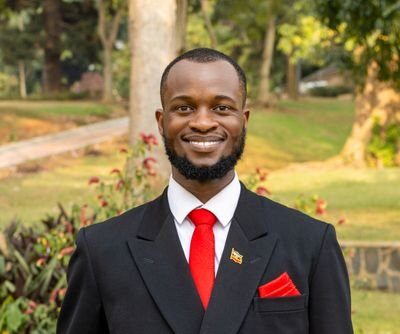By Maria Aliba
Many people will agree that succeeding in today’s workplace has advanced beyond having mere academic qualifications and these days, employers seek more than just academic credentials.
They look for skills, experience, and personal qualities that set candidates apart. One of the ways to pick these skills is by multi-tasking while at the university. A person who knows this well and has seen the benefits is Francis Byaruhanga.
Byaruhanga is a lawyer with a passion for technology law and is currently working as a research assistant for TechnoLegal Advisory Center, Uganda. He is also the CEO of BeBold and founder of Re-Create. He is best described as one of those people “who always have something going on.”
Byaruhanga recently graduated from the School of Law at Uganda Christian University (UCU), but it is his ability to juggle different responsibilities that make him stand out.
“I was very innovative growing up, I used to make cars out of wires, toy-guns and balls out of polythene bags,” Byaruhanga recounts.
When hard times struck, Byaruhanga would find something to do about it. When his father lost his job at Southern Range Nyanza Textile Industries Limited (NYTIL), it was a blessing in disguise, he says, as it led to him changing schools from Jinja College to Holy Cross Lake View SS.
While there, he served as the head boy, and participated actively in several societies and clubs such as the Writers Club, the Debate Club, and the Mustard Seed Club. He also participated in a number of national school competitions including the Stanbic National Schools Championship which transformed his life upon emerging victorious.
“I enjoyed prizes such as getting a scholarship for a course of my choice, an iPad and a trip to South Africa which impacted my life positively. I got exposure and started dreaming bigger,” he says.
When he joined UCU, he served as the Chief Justice of the 25th Guild Government, State Attorney of the 24th Guild Government, Law Love fellowship leader and as the Publicity Secretary at St. Peter’s Catholic Community. Besides leadership at the university, Byaruhanga participated in four Moot Court Competitions including the Philip C. Jessup International Law Moot Court Competition in 2022 and 2023; the Annual National Inter-University Constitutional Law Moot Court Competition organised by Centre for Human Rights Development; and the Christof Heyns All Africa Moot.
In addition to all that, his passion for technology pushed him to participate in the Digital Praxis and the University ICT Services (UIS) Innovation week organised by the Faculty of Engineering, Design and Technology where he emerged as the overall winner, having come up with an app as a solution to the dilemma of missing marks.
“All these competitions involved a lot of hard work, research and teamwork which skills I obtained,’’ he shares.
How Byaruhanga has managed to achieve all this even with a hectic law school course is what makes his story interesting. When asked what advice he can give to students, Byaruhanga says, “One should not wait for opportunity to strike but should always prepare to meet opportunity.’’
He advises young students to let go of fear because their dreams are just on the other side of fear. Byaruhanga says, “My insatiable drive for personal growth and passion to add value to humanity pushes me to multi-task.’’
Multitasking has its cons however. “I did not excel academically as I would have loved to,” the lawyer admits, adding that sometimes one will not be as effective as they could have been if they focused on just one task.
However, he insists, the pros outweigh the cons. Multitasking helps one learn practical skills, leadership, teamwork, networking, time management, and self-awareness.
“Multi-tasking in this regard does not mean doing two things at the same exact time; it means putting your eggs in different baskets and focusing on each basket at a given time, without neglecting the others,” Byaruhanga reasons.
He expounds that “growth comes with many responsibilities, and with these responsibilities, one requires the ability to manage them simultaneously.’’ He therefore believes that “multi-tasking should not be seen as an added advantage, but a basic life skill’’.


